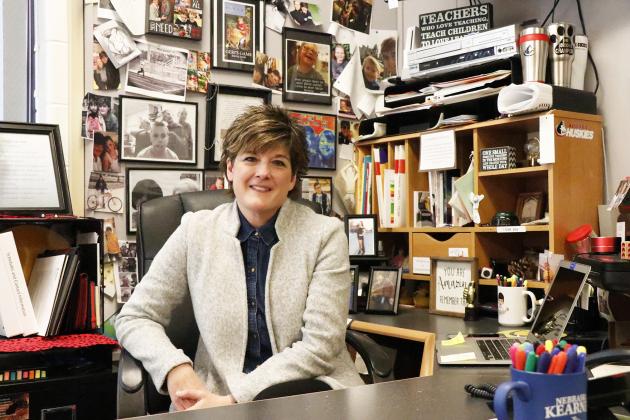Aurora teacher will miss students, staff the most
Taking a bow after 33 years in education, Aurora Elementary School special education teacher Luey Shultz is only a few months away from retiring from a profession that has had a hold of her heart since a very early age.
“I think what makes sense to me is to start back in fourth grade with my teacher Mrs. Hicken,” Shultz began, asked to tell of her life in education. “I knew then that teaching was awesome, because she made me feel so special. I actually have a picture of her on my desk and a letter that she wrote me back in 1990. So I would say that was probably where the root of my love for teaching came.”
Just as she said, her love for teaching only grew after that. Throughout high school and into college Shultz acted upon this love, she explained, by working for Mid Nebraska Mental Retardation Services for seven years. She explained later that this is the moment in her life where it all clicked for her.
“And I think that’s when I realized that I wanted to work with individuals with special needs,” she said. “It’s my passion. I have students (now) that I teach with higher needs and I feel like that’s where my true love is.”
After graduating from what was then Kearney State College, Shultz went on to teach. She spent one year teaching older students elsewhere in Nebraska before coming to the Aurora Public Schools district -- a place she’s been ever since.
“Thirty-two of 33 years have been here at Aurora Elementary,” she said with a smile.
Shultz then earned her master’s degree in education in 2005.
Whether they be nonverbal, on the spectrum, or somewhere in between Shultz recognizes the challenges students have to overcome and enjoys the small successes that come when they do.
“It has to be like the small successes that you find working with kids,” she said of her favorite part of the job.
She directed her attention to a fitting quote on the wall in her classroom.
“We must not, in trying to think about how we can make a big difference, ignore the small daily differences,” it reads.
“I think that’s what this profession has done,” she said. “I’ve just realized that small little things can be huge, especially in this career. Because I know how hard kids work to achieve them.”
Showing a glimpse at how much her professional meant to her, Shultz took a second to compose herself before adding that she’s seen the challenges her students come to school in spite of every day.
“To come to school every day with health problems and mental problems is huge,” she said.
Asked of her teaching philosophy, the education veteran was quick to answer.
“My philosophy is to take a child from where they’re at and move forward,” she said. “Every child is different. Take them for what they are and see the potential in the child.”
Shultz strives to also be an advocate for her students, she said, especially for those that don’t have a voice.
“Teaching has taught me that it is one thing to teach, say words, but it’s another thing to be active in it,” she noted. “We can all read from a teacher manual and teach a lesson; the more difficult part comes in the actions that go along with it. Some learn differently, we need to act on that.”
Her career has also taught her patience, as well as empathy and compassion.
“Your heart needs to be invested,” she said.
Evidence of Shultz’s belief in this lives in a timeline of photos on the wall behind her desk -- what she has dubbed her “wall of heartstrings.”
“These kids have truly not only changed me as an educator, but have changed me as a person,” she affirmed.
Though she typically has the same students until they reach fifth grade, the relationships built don’t end there.
Speaking toward her “successes” throughout her career, Shultz was quick to tie her answers back to those same relationships.
“I had a young man who came to me, and I remember seeing him for the first time in the hallway, he was nonverbal,” she reported. “He had just really learned to walk as a kindergartner. I had him for more than five years, because he would be in our program until at least 21, so we kept him for probably seven or eight years here at this level. Taught him to read.”
Emotions came to Shultz again as she explained that though he could not articulate that he was reading, he could be shown a word and retrieve an object correlating that would show he understood.
Tanner Davison lives on the wall of heartstrings, standing alongside Shultz’s own children. He’s set to graduate this year alongside his classmates.
“They just become a part of who you are,” she said, simply.
Her successes continued throughout her tenure.
“I started Circle of Friends here at the elementary school, back when that was a new thing,” she added with a laugh. “We went on to raise money for Autism Speaks and we were actually the top fundraiser in the state one year.
Shultz was also instrumental in helping to develop the sensory room at the elementary school, as well as lending to the Positive Behavior Support Team which dedicates effort to pushing the “be safe, be respectful, be responsible” mantra to all students.
There have also been challenges.
“The most challenging part of my career I would have to say is the struggles I see with students and families when it comes to emotional and medical issues,” she admitted. “I have seen parents sit in hospitals for weeks at a time waiting for their child to get better. I have seen lives lost at such a young age. That’s something they don’t prepare you for in college, the mental toll of teaching.”
Despite the hardships that come with her field, the students are still what Shultz said she’d miss the most about Aurora when she is gone.
“I feel like it’s obvious, but I’m going to miss those connections with kids,” she said. “I have kids now that are old enough that text me and call me, and we go out for supper once a month…”
The connections will always be there, she agreed.
“What I will miss most about Aurora is the students,” she reflected later. “There are so many students that have found a permanent place in my heart. To the Kates, Tanners, Michaels, Baileys and Dakotas in this world… thank you for all that we learn from you and for leaving an imprint on my heart. They have found a place on my wall of heartstrings.”
She’ll also miss her co-workers, Shultz said.
“I have some of the best co-workers in the state,” she voiced. “I have some of the best para educators. They do not get the credit that they deserve. I have a half a dozen paras that work just in my program that are on the frontlines working with the students so they can be in the general ed classrooms.”
So what’s up next for this retiring teacher?
Spending time with family and friends will be a top priority.
“My kids are older,” she said. “My daughter will be finishing college. I’m excited to go where they go as far as what they plan to do in life.”
Besides seeing more of sons Jayme and Logan and daughter Kennedy, she also noted it’ll be great to spend more time with her parents, who live in Grand Island.
“I plan to use my RV to do some exploring of nearby states,” she concluded. “There is so much out there to see and enjoy and I feel fortunate to be able to do that at a fairly young age. I’m ready to continue to live out my story.”





